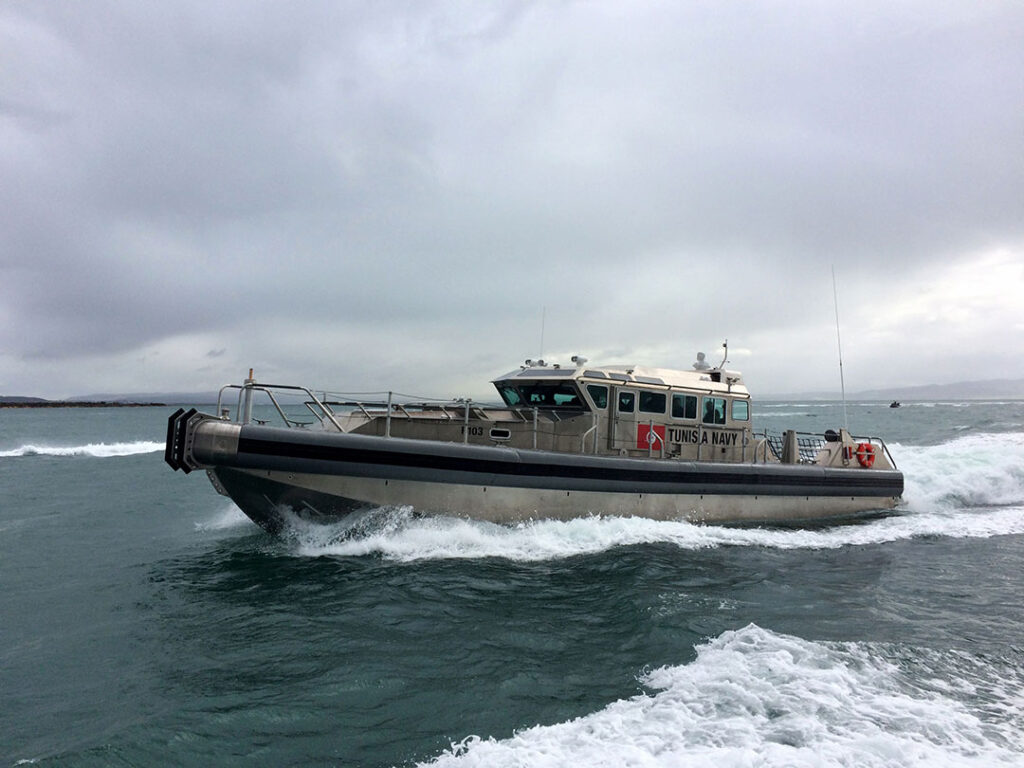ADF STAFF
Tunisia is on track to buy an undisclosed number of 20-meter Archangel patrol boats from the United States at an estimated cost of $110 million. The purchase will include GPS, navigation and communications systems, and training.
“The proposed sale will better equip Tunisia to contribute to shared security objectives, promote regional stability, and build interoperability with the United States and Western partners,” the U.S. State Department announced, adding that the Tunisian Navy uses such boats for “search and rescue, maritime law enforcement, and other maritime-related operations to ensure security in the country and region.”
Tunisia already has similar Archangel boats, bought in 2015. The U.S.-based SAFE Boats International boats are equipped with dual 1,600-horsepower diesel engines, shock-absorbing seating and climate control. Their range is up to 400 nautical miles.
Because of its experience with its Archangel boats, the Tunisian Navy will easily integrate the new boats once they are approved, reports Overt Defense. The boats are intended for use in brown water operations, such as near shore and in inland waterways. Analysts told Breaking Defense that such boats are particularly useful for anti-smuggling and light security patrols. The country has 1,148 kilometers of coastline.
Tunisia faces a host of security problems. Its porous borders allows human trafficking from the south, along with trafficking from neighboring countries Algeria and Libya. The country also faces threats from drug trafficking, weapons smuggling and illegal fishing.
Libya, which has been without a unified national government since a 2011 civil war, has huge stockpiles of weapons scattered throughout the country. It sells them illegally all over the continent and beyond, according to the Peace Research Institute Oslo. Libya’s destabilization has dramatically increased the need for improved maritime security because of the increased risk from smuggled goods, weapons and militants to and from the country.
The Tunisian Center for Research and Studies on Terrorism has reported that a large percentage of terrorists who have operated in Tunisia were trained in Libya, where the Islamic State group and other organizations have established training camps for fighters since the government collapsed. Explosives used in attacks also have been traced to Libya, the anti-conflict group Saferworld has reported.
DRAMATIC CHANGE
Tunisia’s status as a regional maritime force began to change dramatically in 2009, when it received $14.5 million in military financing from the U.S. for 10 small 8-meter response boats and five medium 13-meter response boats, along with spare parts, training and support. Response boats typically are used in counternarcotics operations, search and rescue, trafficking interdiction, and environmental response.
This addition of vessels into the Tunisian fleet amounted to a wholesale recapitalization of its territorial water patrol capability. Officials say the new vessels will replace the Tunisian Navy’s aging boats under 20 meters, which were delivered in 2011, have been mostly used for patrolling, search and rescue, and interdiction.
Tunisia’s naval fleet took another step forward in 2015 with the commissioning of its first domestically produced frigate. The 27.5-meter ship was the product of a public-private effort that used the local industrial base. The Tunisian Navy managed the procurement and carried out the effort, from funding to design and construction, domestically. Seven such ships were planned at the time. At least five have been completed.

